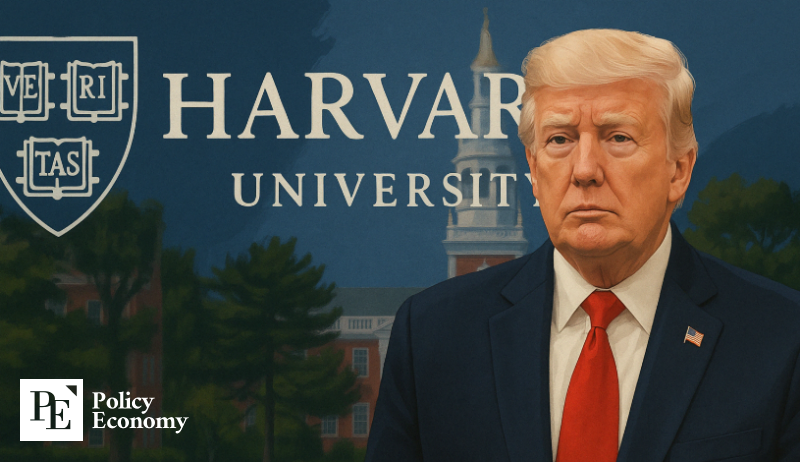Harvard Fights Back: Files Lawsuit Against Trump Administration Over Federal Funding Threats
Input
Modified
Harvard Strikes Back Against Trump Administration’s Targeted Pressure Files Lawsuit Against Secretaries of Health, Education, and Justice “We Will Not Surrender Our Institutional Independence”

After the Trump administration froze over $3 trillion in federal funding to universities, demanding the removal of what it called “leftist influences” such as anti-Israel sentiment, Harvard University filed a lawsuit in federal court. The university argues that the administration’s actions are procedurally improper and unconstitutional, as they pose a grave threat to academic autonomy and violate institutional rights.
Harvard University Sues Trump Administration Over Alleged Federal Overreach
Harvard University has filed a lawsuit against the Trump administration, challenging the federal government’s decision to freeze billions of dollars in funding after the university refused to comply with controversial policy demands.
On April 21, Harvard President Alan Garber issued a statement announcing the lawsuit, stating, “Last week, after Harvard declined to accept illegal demands from the federal government, several retaliatory measures were taken. These actions exceed lawful authority, and we are now asking the court to halt the suspension of federal support.” The lawsuit names multiple federal agencies as defendants, including the Departments of Education, Health and Human Services (HHS), Justice, Energy, and the General Services Administration (GSA).
Garber warned that freezing research grants would have “grave and lasting consequences” not only for patients, students, faculty, and researchers, but also for the standing of U.S. higher education as a whole. “The abuse of governmental authority will have serious long-term impacts,” he said.
The complaint, made public on the same day, alleges that the federal government unlawfully suspended funding to coerce Harvard into altering its academic programs and campus policies. While faculty at Harvard and Columbia have previously filed suits challenging the administration’s actions, this marks the first time Harvard University itself has taken direct legal action.
Administration Weighs Freezing an Additional $1 Billion in Federal Grants
The lawsuit follows months of escalating tensions between Harvard and the Trump administration. The administration initially demanded changes to the university’s admissions process, faculty hiring, and particularly its Diversity, Equity, and Inclusion (DEI) policies—linking the demands to alleged failures to combat antisemitism on campus.
After Harvard refused to comply, the administration canceled a $2.7 million Department of Homeland Security grant and froze an additional $2.2 billion in federal research funding. Officials are also reportedly considering revoking $1 billion in health-related grants and threatening further penalties, including revoking Harvard’s tax-exempt status and restricting foreign student admissions. These actions, if enacted, could cost the university billions of dollars in funding.
The Trump administration has justified its crackdown as a response to “the university’s failure to protect Jewish students during recent pro-Palestinian demonstrations.” However, critics argue that the administration is using antisemitism as a pretext to dismantle academic independence and DEI initiatives across higher education.

A Mistaken Letter Sparks a Constitutional Showdown
The dispute began with the accidental transmission of a draft letter from a federal antisemitism task force. The letter, intended for internal circulation, was mistakenly sent to Harvard by HHS legal counsel Sean Kebeini. It outlined demands for sweeping policy changes, which Harvard interpreted as an official communication from the federal government.
The White House claimed the letter was sent in error, but Harvard rejected that explanation. “This letter bore signatures from three federal officials, was formatted as a formal directive, and was transmitted via email from a senior federal official,” the university said in a statement. “Under those circumstances, no reasonable recipient would doubt its authenticity.”
Even if the letter were sent mistakenly, Harvard argues that subsequent federal actions—including the funding freeze—indicate that the administration treated the demands as legitimate. “Actions speak louder than words,” the university noted, adding that the government had since “doubled down” on its pressure campaign.
White House strategist May Mailman criticized Harvard’s response, saying the university had “played the victim without even verifying the letter’s intent.” She suggested that Harvard’s legal team should have reached out to clarify the issue rather than launching a lawsuit.
But the university maintains that the government’s moves have had tangible consequences, regardless of how the letter was sent. “Even if the administration now claims the demands were a mistake, the impact of their subsequent actions on students, faculty, and the reputation of American higher education has already been significant,” the statement reads.
As the case heads to court, legal scholars say it could set a critical precedent for the limits of executive power over educational institutions, particularly in an election year where the culture wars surrounding DEI, free speech, and academic autonomy continue to intensify.





















